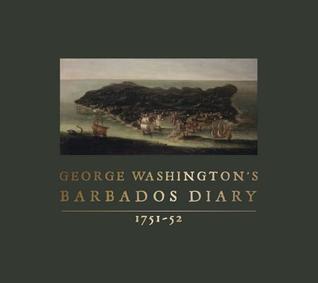- Biblia
- Leer la Biblia
- Versiones de la Biblia
- Verso del dia
- Planes de lectura
- Versos por tema
- Books of the Bible
- Imágenes De La Biblia
- Estudio
- Comentarios
- Concordancias
- Diccionarios bíblicos
- Enciclopedias bíblicas
- Sermones
- Bible Atlas & Maps
- BP Wiki
- Devocionales
- Devocionales de hoy
- Light of the World
- Todos los devocionales
- Inspirational Quotes
- Más
- Picture Quotes
- Videos
- Inspirador
- Estudio Bíblico
- Lo que dice la Biblia
- Bible Q&As
- Daily Bread
- Bible by Genre
- Bible Stories
- Random Bible Verse
- Comunidad
- Store
George Washington's Barbados Diary, 1751-52
by George Washington
In the autumn of 1751, at the age of nineteen, George Washington sailed with his older half-brother Lawrence from Virginia to the Caribbean island of Barbados--the one and only time that the future Revolutionary War hero and president would leave the shores of continental North America. Lawrence had long been in poor health and hoped, in vain, that the island climate would prove restorative. The Washingtons landed in early November, and George spent seven weeks on Barbados, recording his impressions of everything from the exotic landscapes and local culture, to the cultivation of sugarcane and the particulars of plantation slavery, before bidding his brother adieu and embarking on the return sail to Virginia. The two sea voyages provided plenty of adventure, at times harrowing, and framed an island interlude that exposed young George to new cultures and new experiences--and also to smallpox. His exposure to the dread disease, and his resulting immunity, would prove fateful a quarter century later when the commander in chief of the ragtag American revolutionary forces blunted a threat more grave than British cannon by directing the immunization of his troops. Technological advances and fresh scholarship make this the most comprehensive and authoritative edition that has ever been--or likely will ever be--published.
BUY NOW
Hardcover, 216 pages
Published July 16th 2018 by University of Virginia Press
Suscribir
© 2025 Bibleportal.com Reservados todos los derechos.

George Washington was the commander of the Continental Army in the American Revolutionary War (1775-1783) and served as the first President of the United States of America (1789-1797). For his central role in the formation of the United States, he is often referred to as the father of his country.
Washington was baptized into the Church of England. In 1765, when the Church of England was still the state religion, he served on the vestry (lay council) for his local church. Throughout his life, he spoke of the value of righteousness, and of seeking and offering thanks for the "blessings of Heaven."
The Electoral College elected Washington unanimously in 1789, and again in the 1792 election; he remains the only president to receive 100% of the electoral votes.
Washington proved an able administrator. An excellent delegator and judge of talent and character, he held regular cabinet meetings to debate issues before making a final decision. In handling routine tasks, he was "systematic, orderly, energetic, solicitous of the opinion of others but decisive, intent upon general goals and the consistency of particular actions with them.
Washington died in 1799. He has been consistently ranked by scholars as one of the greatest U.S. Presidents.
... Show more